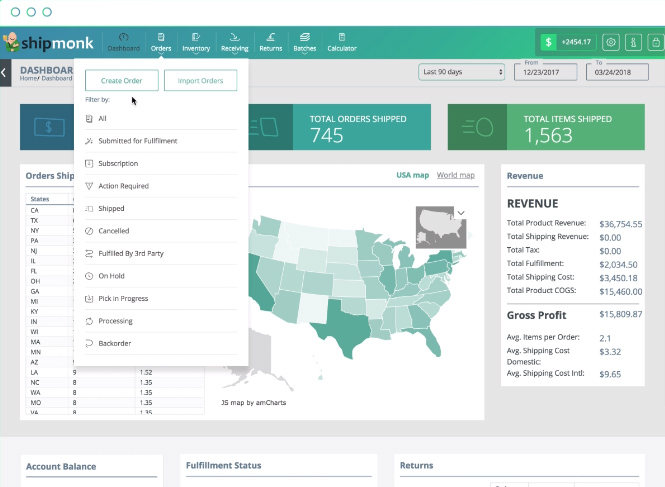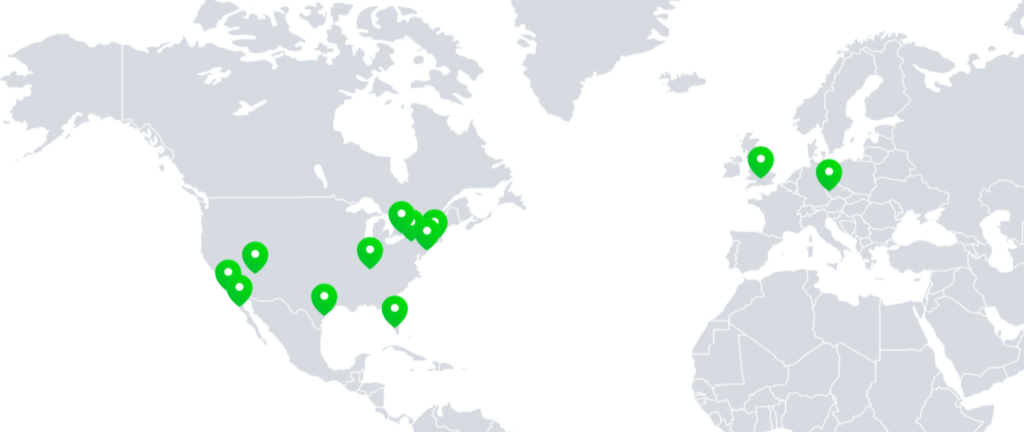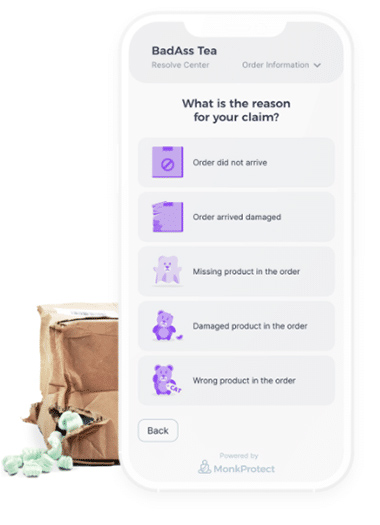ShipMonk is a third-party logistics (3PL) company for small and midsize businesses that provides warehousing, order fulfillment, and shipping solutions. It specializes in ecommerce, crowdfunding, and subscription box fulfillment with additional services for Fulfillment by Amazon (FBA) prep and international shipping.
In our evaluation of the best order fulfillment companies for small businesses, ShipMonk came in fifth place with a score of 3.79 out of 5. Its tech-forward platform aims to reduce fulfillment costs and increase operational accuracy through robotic automation and advanced warehouse management systems (WMS). Read more in our ShipMonk review.
ShipMonk Overview

Pros
- Support from a dedicated customer service rep with client-specific training
- Advanced accuracy measures and warehouse automation
- Programs for crowdfunding projects and subscription box services
- Amazon Seller Fulfilled Prime-eligible
Cons
- Limited international fulfillment network
- Difficult to terminate services
- Extra fees for items over 5 lbs.
- Hidden costs reported in fine-print pricing details
Deciding Factors
Supported Business Types | Ecommerce sellers, retail stores, small to midsize businesses, startups, D2C sellers, online marketplace sellers, B2B sellers, crowdfunding projects, subscription-box services |
Standout Features |
|
Minimum Requirements | $250 monthly usage |
Pricing |
|
Contract Length | None |
Warehouse Locations | 8 US; 1 Canada; 1 Mexico; 2 UK |
Shipping Partner Options | FedEx, UPS, USPS, DHL, DHL Express, Passport |
Customer Support | Via phone, email, or live chat; 9 a.m.–8 p.m. Eastern to, Monday–Friday |
Is ShipMonk Right for You?
ShipMonk is a good fit for:
- Ecommerce retailers: ShipMonk is one of the top choices for DTC and B2B ecommerce order fulfillment and shipping.
- Groupon, Etsy, and subscription box sellers: ShipMonk works with sales channels that many competitors don’t.
- Crowdfunding projects: ShipMonk has affordable batch fulfillment programs
- Amazon sellers: ShipMonk is Seller-Fulfilled Prime (SFP)-eligible
ShipMonk is not suited for:
- High-value, heavy, fragile, oversized, or dangerous products: Red Stag Fulfillment is more economical for special-handling needs, whereas ShipMonk is best for lightweight and manageable goods.
- Global distribution: We recommend ShipBob for its wide international warehouse network, which includes a greater European footprint compared to ShipMonk.
- Hybrid fulfillment: Saltbox is the only 3PL that gives you hands-on control plus third-party resources, making it helpful for sellers wanting a more in-house experience than outsourced providers like ShipMonk.
ShipMonk Alternatives
Best For | Minimum Monthly Requirement | US Warehouse Locations | Error Rate | Read Full Review | |
|---|---|---|---|---|---|
Ecommerce fulfillment for small to midsize, lightweight goods | $250 min. spend | 35+ | 0.05% | ||
Products requiring special handling | ~200 orders | 2 | 0.02% | ||
Scaling in-house fulfillment | None | 9 | <1% | ||
Amazon fulfillment | None | 40+ | Undisclosed | N/A | |
(previously Deliverr) | Selling on competitive marketplaces | None | 40+ | Undisclosed | N/A |
ShipMonk User Reviews
| Users Like: | Users Don’t Like: |
|---|---|
| Responsive support from “Happiness Engineers” | Hidden fees and surcharges, excessive overcharges |
| Warehouse efficiency | Poor customer support |
| Software ease-of-use and clarity | Unmet SLAs and frequent errors |
| Flexible services | Difficult, lengthy termination of services and migration process |
ShipMonk’s user rating took a significant dip in recent years, but has been slightly on the rise since mid-2023, with many new positive comments from customers. Users who left positive ShipMonk reviews often mention efficient services, fast order turnaround times, and easy-to-use software. Many customers also cite their account manager as being helpful and responsive.
That said, negative ShipMonk reviews are still frequent, and describe repeat overcharging (sometimes exceeding $8,000), lost inventory, excessive errors, and issues with customer support. Users also report significant challenges in ending services with ShipMonk and retrieving their inventory.
- Trustpilot: 4.1-star rating from 300+ reviews
- Capterra: 4.1-star rating from 100+ reviews
- G2: 3.7-star rating from 30+ reviews
ShipMonk’s billing portal gives a clear breakdown of monthly fulfillment costs, providing billing transparency that works in tandem with the company’s straightforward fulfillment pricing structure. Despite this, numerous recent reviews report overcharging, hidden fees, and high shipping rates.
The ShipMonk pricing model is scalable with volume discounts starting at 500 orders/month, but note that fragile or heavy items over 5 pounds incur extra charges—making an alternative like Red Stag Fulfillment a more cost-effective option for these goods.
ShipMonk offers varied services like ecommerce and subscription box fulfillment, each with unique pricing, and their site features a simple five-step calculator for cost estimates. There is a minimum $250 monthly pick-and-pack spend to use ShipMonk’s services.
Here’s a look at the standard ShipMonk pricing for order fulfillment:
Service | Cost* | What It Covers |
|---|---|---|
Onboarding | $0 | Onboarding and account setup are free |
Receiving | $0 when shipment guidelines are met; Starts at $300 per 20’ container if not met | Inbound stock receipt, unpack, and check-in |
Inventory Storage | $25 per pallet/month, or $1–$4 per bin/month | Storage, security, and inventory management |
Pick and Pack | $3 for the first pick per order, 75 cents per additional item | Picking items from inventory and packing them for shipment |
Packaging Materials | 15 cents–$2 per order | Standard packaging and dunnage |
Shipping | Discounted rates available with 5 carrier partners | Shipping costs vary depending on the size, weight, and destination of your goods |
Returns | $2 per order + 50 cents per item | Return processing, quality check, and restocking |
Special Projects | $45/person-hour | Includes tasks like counting inventory, repackaging products, quality control, bagging products, or any other generic task not a part of your plan. |
ShipMonk offers traditional third-party fulfillment services with modern updates. The company focuses on strong customer service and efficiency, aiming to enhance quality and functionality compared to competitors.
Click below to expand on the features that contribute to ShipMonk’s Quality and Functionality score.
ShipMonk’s customer support includes dedicated service reps, extended customer service hours, multiple service facilities, and a ticket-based resolution system.
Unlike some competitors (such as FBA and ShipBob), ShipMonk’s entire customer service team is based domestically, enhancing communication and issue resolution according to many online reviews. The company also offers online support forums and a knowledge base. However, some long-time users have noted a decline in customer service quality since October 2022, describing the support team as unhelpful and unresponsive.
ShipMonk creates an edge for itself by using high-tech enhancements throughout the fulfillment process. These warehouse upgrades increase productivity, optimize space utilization, enhance product security, and increase overall efficiency.
According to ShipMonk, the increase in efficiency results in lower fulfillment costs for its clients, with pick-and-pack services that are 4x faster than the industry average and a 400% improvement in storage efficiency.

Storage and retrieval machines (SRMs) perform automated picking tasks in ShipMonk’s warehouses. (Source: ShipMonk)
ShipMonk’s warehouse system uses RFID technology to tag and track storage locations, allowing it to identify when product bins are being replenished, picked, or moved.
Additionally, a dimensional scanning device is used to identify the best and most protective packaging for each unique item. Similar devices are used by Red Stag, ShipBob, and other competitors.
ShipMonk gives its users free access to its fulfillment software, highly rated for its intuitiveness and user-friendliness. This platform enables order, inventory, and shipping management, along with reporting capabilities. Its forecasting feature predicts stock depletion, suggesting reorder dates and quantities, and includes a comprehensive portal for handling returns and exchanges, including label creation and return status monitoring.
While ShipMonk’s software efficiently covers major processes, its reporting and analytics features fall short compared to competitors. For more advanced and varied reporting options, I recommend ShipBob.

ShipMonk’s software displaying its order management menu. (Source: ShipMonk)
ShipMonk’s fulfillment network is smaller than certain competitors (like ShipBob and FBA), but still allows for ample inventory distribution.
ShipMonk currently has eight US warehouse locations mainly positioned near the coasts, allowing sellers to store and ship inventory strategically. The company also has four international locations: Mexico, Canada, Czech Republic, and the UK. All of ShipMonk’s fulfillment centers are equipped with secured storage facilities and automation technologies.

ShipMonk has a total of 12 warehouses throughout the US, Mexico, Canada, and Europe. (Source: ShipMonk)
ShipMonk offers turnkey integrations with 75+ ecommerce solutions and tools, including all of the leading shopping carts and marketplaces. These direct integrations are free and fast—and many are two-way compatible.
Here’s a complete list of ShipMonk’s direct integrations:
- Ecommerce platforms and shopping carts: 3dcart, Magento (Adobe Commerce), AmeriCommerce, Big Cartel, BigCommerce, Cratejoy, CS-Cart, Ecwid, FoxyCart, MijoShop, Miva, Neto, OpenCart, Oxatis, PayPal, PrestaShop, RevolutionParts, Shopify, Shopify plus, Soldsie, Squarespace, UltraCart, Volusion, Weebly, Wix, WooCommerce, X Cart, Zen Cart, Zoey
- Marketplaces: Amazon, Back Market, Bonanza, Cratejoy, eBay, eBay.ca, eBay.co.uk, eBay.com.au, Etsy, Groupon Goods, Houzz, Jane, Jet, Newegg Marketplace, OpenSky, Reverb, Sears, Sophio, Storenvy, Tanga, Tophatter, Walmart.com, Wish, Yahoo
- Retailers: Target, Walmart, Best Buy Marketplace, QVC, Marshalls T.J. Maxx
- Multichannel management: Brightpearl, ChannelAdvisor, ChannelSale, Commerce Cloud, Linnworks, Sellbrite, SellerActive, Stitch Labs, SureDone, QuickBooks Commerce, SPS Commerce, ListingMirror, MoreCommerce
- Freight and shipping solutions: ShipStation, Rakuten Super Logistics, Passport, EasyPost, Happy Returns
- Operations, inventory, and order management: Acumatica, Cin 7, DEARsystems, Freestyle Solutions, Skubana, Returnly, GeekSeller, Optoro, Spark Shipping, Extensiv, TradeGecko, Toolio, Loop Returns
- Payments, accounting, tax, and financing: Bluevine, Brex, KickPay, Stripe Relay, PayPal, Handshake
- Marketing and CRM: Fullscreen Direct (StageBloc), Salesforce (Demandware), LaunchBoom, HawkeMedia, Gorgias
ShipMonk offers purpose-built programs and services for a range of specific use-cases—like crowdfunding ventures, subscription box businesses, omnichannel retailers, and Amazon sellers.
It also delivers special features to aid its users in expansion and cost reduction. However, the company was docked in this section of our ShipMonk review for its lack of climate control options and special handling capabilities.
ShipMonk’s specialty services include:
ShipMonk’s warehouse network is local to North America, with two additional locations in the UK. This limited global reach isn’t ideal for local international fulfillment, which is the best way to reach foreign markets with low transit costs and fast delivery.
However, sellers can use the company’s cross-border shipping services to fulfill international orders with stock stored domestically.
ShipMonk offers Delivery Duty Paid (or DDP) services that display shipping, tax, and duty costs at checkout—eliminating unexpected fees upon delivery. The feature also shows international customers their expected delivery timeframe, and provides advanced tracking after checkout to keep them in the loop.
Section 321 is a type of shipment used to clear the US Customs and Border Patrol (CBP). Under Section 321, shipments can bypass the tariffs and duties typically associated with international packages. One of the most commonly used ways to qualify for Section 321 is to send shipments valued below $800.
ShipMonk leverages its warehouses in Mexico and Canada to take advantage of this legal loophole. Sellers can ship merchandise to these locations and then incrementally import it into the US, divided into multiple $800 portions. This completely eliminates duties for volume importers, reducing total landed costs with minimal added transit time.
ShipBob and ShipHero also facilitate duty-free import through Section 321 from their warehouse locations in Canada.
ShipMonk offers flexible packing options, allowing custom materials and specific assembly instructions for a unique unboxing experience. Any order can also be photographed before sealing, providing a visual confirmation of the packing accuracy.
While ShipMonk can’t design or develop custom packaging elements for you, your support rep can help you source custom materials through a partner solution.
The company is flexible with its kitting projects, inviting sellers to include customized add-ins like thank-you notes, coupons, branded packing elements, and samples. Plus, ShipMonk has well-developed programs for subscription boxes and other non-traditional sales.
ShipMonk also delivers branded tracking pages. This service is part of an integrated program called MonkProtect, explained further in the next section.
A branded tracking page provided by ShipMonk (Source: ShipMonk)
ShipMonk offers a suite of post-purchase tools called MonkProtect. The product combines delivery protection, branded tracking, and an automated claims portal to enhance the purchase experience and promote customer retention.
MonkProtect provides seamless insurance coverage for an added fee at checkout (based on the value of the items in the cart). When customers sign up for the service, they receive a branded confirmation email with advanced tracking information and a link to the self-service claims portal. The service integrates directly with your ShipMonk fulfillment platform to centralize and automate claims resolution.

MonkProtect’s claims portal (Source: ShipMonk)
One of the biggest reasons that some sellers choose ShipMonk over ShipBob is its compatibility with certain sales channels—namely Etsy and Groupon. ShipBob doesn’t integrate with those marketplaces, which could cost certain retailers a large portion of their sales.
ShipMonk’s services are versatile and accommodate many different alternative marketplaces and business models, including Amazon Prime sales, crowdfunding ventures, product launches, and subscription boxes.
ShipMonk’s platform prioritizes ease of use and aims to minimize the learning curve, earning it a high score in this category of our ShipMonk review. Its intuitive software and first-rate customer support were some of the biggest considerations. Here’s a summary of the factors we took into account:
- Policies: In the event of a fulfillment or shipping error, ShipMonk will pay either the return postage or replacement value of incorrect items shipped (whichever is lesser), ship the replacement order, and waive its associated fees. This is a helpful policy only for non-valuable goods.ShipMonk allows for up to a 2% breakage rate due to improper packaging. Claims can only be submitted if your inventory is damaged beyond that threshold, so we prefer Red Stag’s 100% guarantee for fulfilling fragile goods.
- Free Receiving: The company’s free inbound-shipment receiving is an enticing feature, but it comes with some stipulations. Your inventory will not be counted or audited but rather inputted on a “good faith” basis—meaning that your reported quantity is what ShipMonk will record. If you ship orders from a third-party manufacturer straight to your fulfillment partner, this policy can create accuracy problems and inventory deficits.ShipMonk’s free receiving also has strict packaging and quantity requirements. They shouldn’t be hard for most sellers to follow, but in the case that your shipment deviates from its requirements, ShipMonk reserves the right to delay or altogether reject the shipment with no liability. Qualifying inbound shipments are received and put away within three business days.
- Accuracy: ShipMonk advertises a 99% accuracy rate in fulfilling and shipping orders.
- Customer Service: During onboarding, each account is assigned a dedicated client support representative (called your “Happiness Engineer”), the main point of contact throughout the business relationship.ShipMonk customer service can be reached by phone, email, or through the company’s ticket-based resolution platform. Additional support facilities are located at each fulfillment center; their hours are 9 a.m. to 8 p.m. Eastern time, Monday through Friday.
- Order Processing Transparency: ShipMonk’s dashboard provides some level of insight into where your orders are within the fulfillment process, but the functionality isn’t nearly as developed or in-depth as that of competitors.
- Billing Transparency: Invoices are available monthly from the dashboard in the Billing tab, where charges are visible by line item.
Our ShipMonk review gave the company a moderate Expert Score rating due to its good value and broad services, but its mixed reviews affected its overall score. It’s suitable for diverse small businesses with its low monthly minimums, unlike other 3PLs that mainly cater to high-volume or traditional ecommerce.
However, for better global expansion support, ShipBob is a better choice. Additionally, ShipMonk’s lack of special handling services for oversized or heavy products makes Red Stag more suitable for certain sellers.
Methodology: How We Evaluated ShipMonk
To evaluate ShipMonk and competing fulfillment services, we consider the factors that matter most to small retail and ecommerce businesses.
We then evaluate each provider on a 23-point scale shaped by industry experience, reader surveys, and competing providers’ attributes. Our criteria weighs functionality, scalability, and transparency throughout a range of processes.
30% of Overall Score
We assessed each company’s service quality and functionality, focusing on order turnaround time, shipping partners, fulfillment center network size, and accuracy. Integration with ecommerce platforms, marketplaces, and operational tools was also considered.
ShipMonk’s score was slightly reduced due to its limited global reach, despite its strong integrations, shipping choices, and efficient processes, resulting in a total score of 4.55 out of 5.
20% of Overall Score
Many fulfillment companies use custom-quoted pricing, making a direct comparison difficult. For this reason, we evaluate each provider for its transparency and predictability.
The ShipMonk pricing structure lends itself to predictable monthly bills, but some customers report frequent overcharges and hidden fees, which brought its score down to 2.75 out of 5 points.
15% of Overall Score
This evaluation considered customer service access, software functionality, and scalability. Points were awarded for dedicated client support and transparent order tracking.
ShipMonk scored for its operational transparency and customer service hours, but was surpassed by services offering 24/7 support. Its accessible minimums are good but may limit startups. Overall, ShipMonk received a 3.94 out of 5 score.
15% of Overall Score
Points in this section were awarded based on special services such as international shipping, custom packaging, and various assembly types. Key factors like return handling and analytics/reporting were emphasized. Additionally, we evaluated the ability to fulfill Amazon Prime and SFP orders.
ShipMonk scored 3.95/5, gaining points for Amazon Prime compatibility and customization options, but lost points due to the absence of climate control and custom packaging creation.
20% of Overall Score
This score combined our retail and ecommerce experts’ final evaluation of value, ease of use, and standout features with scores from real-world users on trusted third-party review sites
ShipMonk received 3.44 out of 5 points in this category for delivering good value, painless usability, and a range of specialty services. It was docked for its negative Shipmonk user reviews.
ShipMonk Review Frequently Asked Questions (FAQ)
ShipMonk provides third-party order fulfillment and shipping for retail businesses, including ecommerce brands, subscription box companies, B2B sellers, and crowdfunding projects. When these businesses are receiving more orders than they can or want to fulfill on their own, they can hire ShipMonk to handle inventory storage, order processing, packing, and shipping.
ShipMonk is a good fit for small to midsize businesses that sell physical products online. Since the company requires a monthly $250 minimum pick-and-pack fee, it’s best for sellers that fulfill roughly 80 orders or more per month. ShipMonk specializes in fulfilling DTC ecommerce sales but offers well-developed programs for B2B sellers, crowdfunding ventures, product launches, and subscription box services.
ShipMonk is a third-party logistics (3PL) company, meaning it specializes in handling logistics services for other businesses. This includes outsourcing fulfillment, shipping, inventory management, and freight needs.
Bottom Line
Our ShipMonk review found that the provider is a good choice for small businesses dealing in small, lightweight, shelf-stable, and manageable products to outsource their fulfillment operation. However, we recommend evaluating multiple options to ensure a good match between you and your fulfillment provider.
Broker sites, such as WarehousingAndFulfillment.com, compare your specific needs to 500+ pre-screened companies to find the best fit for your business. Plus, the service is completely free to use.